Diary of Anais Nin, Volume 5 Read online
Page 8
If Ted hides his thoughts in his diary, Sylvia hides her poet self, until one day I discovered it and was delighted with it, and feel it must be sustained. She is a witty and sensitive poet.
Ted's first story was this: "Fresh out of Harvard, I got a job with a famous and wealthy psychoanalyst who was writing a book—a study of Bonaparte. He was given to plagiarism, and I was employed to deplagiarize his books. We lived in a sumptuous apartment overlooking the Park, near the Zoo. He liked to get up early, but I didn't. Not wanting to be too direct about it, too gauche, he never made an issue of this. But when he took his early-morning walk around the reservoir on his way home he would stop at the Zoo and rouse the lions, who roared angrily and so loudly they awakened me."
Ted brought out the separate chanter on which the Scotch practice for the bagpipes and showed me his clan colors.
Sylvia showed me an anthology of Garden Poems she had gathered together.
It was through them that I discovered an ironic absurdity. The big grants and fellowships demanded a professional presentation, elaborately set up, of information, budgets, recommendations, et cetera, which could only be properly done by professionals. If the artist cannot afford such a presentation his chances of obtaining grants and fellowships are very slight. I saw a presentation made by Sylvia, sixty pages of careful statistics and information.
Sylvia's description of events, places, and people always delights me. When I return to New York all I have to do is see them to be in touch with the pulse and center of New York activities. But all of it always bathed in an atmosphere of enjoyment, appreciation, and human involvement. We share many friends, and ultimately in every life I find traces of Sylvia's or Ted's kindness.
New York.
Peggy Glanville-Hicks, music critic of the Herald Tribune, and composer. She is on the music committee board of the Museum of Modern Art. She is small, very slender, very quick, with eloquent hands designing patterns in space to illustrate her talk. She has a small, impish face, with innocent, sharp, focused eyes, a humorous uptilted nose, a dimpled smile. She is decisive, sharp-witted. She wears her hair short, like an adolescent, brushed upward. She is a witty polemist. It does not appear at first like a battle. Her swordplay is invisible, it is done with a smile, but the accuracy of it is deadly. She mocks the composers and the critics who interfere with the development of a woman composer. She is asked to recommend, to bless, to support lesser composers, to introduce them, help them on their way. But this help is not returned. It was the first time I had heard a brilliant, effective woman demonstrate the obstacles which impaired her professional achievement because she was a woman.
I gave her all my books.
She wrote me a letter:
I am so glad you have written these things, personally glad. I found myself marking passages that expressed so implicitly things and thoughts that have been to me burning ineloquence all my days. Music is less precise, it embodies the feeling content of things rather than the significance and intelligence, and though this too has its great advantages as a form of expression, I often miss the greater precision of rational thoughts, or what you have miraculously done, brought the levels of super-rationality within the confines of the rational mind. How rare a thing it is when such radiant participation in life is balanced by inward penetration, and the ability to effect the equation in expression.
From then on she treated the characters in my novels as persons, already incorporated into her own life, existing.
"Paul in Children of the Albatross is Paul Bowles, isn't he, and Zora is Jane Bowles?"
"No, I never knew them."
"Of course, you are a jump ahead, you know, and you will have to wait for the others to catch up. It is a private world completely familiar to me."
We only disagree on psychoanalysis. She calls it the work of the devil. And she mistrusts science. She is on the side of the mystics. But because of her own climate, its elevations. I felt I would rather have her praise than a million other acceptances. She restored my spiritual pride, lost in a maze of humiliations.
Peggy had surgery. Her sensitiveness was violently jarred by the callousness, noise, and vulgarity of the hospital. Nowhere is inhumanity more revealed than in hospitals.
She came back to her apartment on Sunday. Sylvia Spencer and I took shifts to take care of her. At six A.M. Peggy telephones in a small voice: "Nin, please come." I put on black wool slacks, a black wool blouse, a heavy black coat and wrap my head in a shawl. It is bitterly cold. At her address I insert the key. First of all I smell the flowers sent by Yehudi Menuhin and Carlos Surinac.
I taped the windows against the cold, brought up the mail, watered the plants, gave her medication. I stayed until Sylvia came. We were very professional and left notes on what we had done, as nurses do.
I was giving back to her all the care I had received from others, passing on all I had been given.
Aside from the critical moments of pain, she was cheerful and ate with pleasure. Slowly this energy which seemed only intellectual and spiritual returned to her body, and she began to sparkle again. All her strength is in her spirit, to sustain a hypersensitive body. Doctors are blind to treat such a person as they would others. A finer specimen, more complex, and needing careful handling. She is convalescing now. For four days I lived only for her.
We talked quietly while I sewed. Touching lightly on our lives. Not too deeply. She is shy of the personal.
I teased her about wanting her in the family. I wanted her as a wife for Joaquin. But Joaquin found her "prickly."
"But I am part of your family without benefit of legalities," she said.
When Sylvia or I arrive with food she says: "How is the commisary?"
She is full of drolleries.
One morning she asked for the return of her birds, and the cage sat on her bed. Yellow and blue parakeets were chirping and flying about the room. The two lovebirds quarreled, so Peggy had bought a cage with an attic where Fiasco could go and sulk.
The room was full of sunshine. She told me about the lapwing bird: "It erases its tracks as it makes them, brushing the sand with its tail wing. When I travel I feel that is what I am doing, erasing my tracks."
She loves the clarity in Joaquin's musical writing.
I wanted to live on the outside, to see how it was to stay outside and never re-enter the cave of the interior life. I stayed outside, in cars, in buses, in planes, and never stopped to write in the diary. I did work on the novels.
Stanley [Haggart] set up a Negro cleaning woman as a night-club singer in Harlem, and we all went to hear her, out of loyalty, but she was not a good singer. I asked Stanley why he did that. He answered: "Because I did not like her cooking."
***
Joaquin is now Chairman of the Music Department at Berkeley, appointed by unanimous vote.
Took photographs of Cornelia Runyon's work to the Museum of Modern Art, to Philip Johnson, the architect, who is one of the directors. He gave them to Mr. Ritchie, in charge of sculpture. Johnson was impressed. He invited me to visit his glass house at New Canaan, Connecticut.
Philip Johnson's glass house was interesting. A feeling of living completely out of doors, set in the middle of twenty-five acres of forest. The only enclosure was a big round towerlike construction for the bathroom. But strangely enough, I missed the sense of shelter. I could not have gone to sleep without a feeling of protection, a wall, a tent, a corner somewhere. Also there was no room for books or paintings, as they would interfere with the view. So he had to build another building behind the house to contain records, books, paintings. Sculptures look well, his Giacometti beautiful silhouetted against the forest.
New York.
Tennessee Williams gave me tickets for The Rose Tattoo. Maureen Stapleton was wonderful; she acted a wild primitive Sicilian very much like a stormy Anna Magnani, utterly convincing. Play very moving, humorous, and hysterically emotional. I was surprised the American audience took it, as they dislike displays of emotion. It could have been an Ita
lian play. I wonder if Americans find relief in letting foreigners emote for them. They do come to see it. Such a mixture of poetry, sensuality, and vigorous naturalness.
A friend called me in desperation because he had no money and wanted so much to see the play. I mentioned him to Tennessee. He called me again to tell me he had been given the goat to take care of every night after the show.
Met Robert Flaherty. A delightful old Irishman, preparing to go around the world testing a new camera. He was suffering from the many injections he had received but in spite of that was cheerful, told delightful Irish stories connected with his film-making. The barrels of beer he has consumed have become a part of his anatomy.
My deep admiration for Nanook of the North made this a momentous visit. I can see why people loved to work with him.
I was told that in one instance he was pressed to give the producer a script, and he sent in a sheaf of blank pages. For both Serge Eisenstein and Robert Flaherty financial backing was difficult to get. They both suffered from interference and lack of confidence in their spontaneous way of working. They never found a generous, lavish backer.
A young woman strongly objected to my writing: "Boulevards throwing off erotic sparks."
In New York I met Maxwell and Anne Geismar.
Our friendship started inauspiciously. I protested a review Maxwell Geismar wrote about Tennessee Williams' play in which he made the narrow-minded statement I had so often heard: that Williams did not belong to the mainstream of American literature because he was writing about neurotics, a peripheral, special, and limited minority.
I wrote to Maxwell Geismar that the writer is a prophet, and that Williams is feeling the deep currents of neurosis which run under the surface of American life, and that one day what seems to be a study of a segment becomes the diagnosis of a much vaster illness.
He responded mildly, conciliatory. We agreed on a visit. Personally the Geismars are brilliant, witty, and mature. We had a gay evening. I did not know then, as I found out soon after, that Max is a Marxist critic, and sees all literature only as a function of politics. Thus the depiction of neurosis is directed at a few individuals. The "people" are free of taint.
[Spring, 1951]
I decided to call this trip to Mexico the Journey of the Neon Cross. For the first time, the crosses on the Catholic churches appeared in all the shoddy splendor of neon.
In Mazatlán the carriage ride took me back into an atavistic past. The top of the carriage is of canvas with fringes like the carriage in which I drove with my parents in Evian when I was six years old. The houses are pink and turquoise. The windows are always either shuttered with green shutters or protected by grilles.
There was a boa constrictor on the road, dead, being eaten by vultures.
In the hotel the water closet was inside of the shower.
On the road a cow skeleton was propped against a tree.
A peasant house where we stopped for beer. Cool, trellised shade created by bamboo and palm leaves. A crib hanging from a ceiling. The floor was of dirt, but neatly swept. The walls of bamboo reeds placed not against each other but with a space in between to let the air through. The young woman wore a dress like a nightgown, the Yucatán white dress with embroidered sleeves or neckline. She wore a white handkerchief over her head. In the evenings we saw them eating out of doors, by candlelight, the entire family. The oven for breadmaking outside, round, like a giant anthill.
Oxcarts give a biblical flavor to the fields, the white Brahma bulls. Some chariot wheels askew, as if drawn by a child.
At Mazatlán we saw the traveling circus. It was so small, and the trappings seemed so frail and worn that I felt a constant anxiety about the frayed cords, the corroded ladders, the rain coming through the roof which could make the aerialist slip. The feeling of weary, overworn clothes, of worn ropes for the acrobat on his bicycle, of flimsy cages for the lion, of unsteady ladders, and nets with unrepaired holes in them. The whole circus was an act of triumph over matter, a greater challenge to human agility.
In Tepic vultures sat around the cemetery walls. In the north of Mexico the cemeteries were black stones piled up with unpainted crosses. In Mazatlán the tombstones were painted in joyous greens and pinks. The plastic flowers were in pastel colors.
The ferry was called chalana, a word which has a biblical flavor like chalote for shallot. To watch the dark people eating watermelon was a feast for a painter. The watermelon, at times as delicate a pink as the heart of a shell, and sometimes vivid with its black pits like eyes.
Tepic was festooned with blue and white ribbons of paper cutouts for the Virgin Fatima, the dark-faced Virgin. There were castles with towers of fireworks. Wheels of fire tongues dashed like wild comets among the people. Showers of purple sparks, which the children sought to be drenched in. People were chanting Ave Marias while walking, carrying lighted candles. The young women in white dresses. Outside the church were stalls selling sacred blessed trinkets, and people brought pictures to be blessed by the priest, crippled children, very old people on stretchers. It was like Lourdes, and the expectation of miracles was strong. The Neon Cross had not lost its magic power.
The churches of Mexico are their only Oriental splendor. Their own shacks so poor, but they delight in the Scheherazade ornamentation of churches. Their dream suffices them.
The hotel room so shabby in Puebla. Large and high-ceilinged, but with peeling plaster, cement floors creviced from the numerous earthquakes, a hard bed, and water trickling constantly from the leaking plumbing. The electric light was put on by making two naked wires touch. Under the bed a chamber pot. The water closet so far away and impossible to find.
I saw one of the oldest trees in the world, two thousand years old. A juniper called sabino in Spanish.
Like Islamic people, at dawn they cover their mouths, from a fear of early-morning fogs.
In Zihuatanejo the catre(army cot). No sheets. Communal washbasin and towel. Half mirror.
At Lake Pdtzcuaro all I remember is the somber dignity of the men in their heavy woolen ponchos. In Tehuantepec the cotton ball trees. The mauve sandstone. The women's dresses, the heavy velvet skirts and lace blouses and lace headgear, the gold-coin necklaces, the lace petticoats showing at the edge, the hair braided high, interwoven with variegated cotton ribbons. The gold earrings. The heavy, fiat-soled walk of the gypsies, proud and arrogant, even while watching their stands, selling fruits, or ribbons for the hair, or textiles, or pottery. The women handle all the markets, own the property. It is a matriarchy. The men are smaller than the women. They sit in cafés and play guitars. At the market, besides the large black cauldrons of wonderfully spiced food, around which they sit to eat, one also sees these astoundingly beautiful women combing each other's hair, which often reaches to their ankles.
Lake Chapala. The graceful sailboats of the fishermen. The delicate tracery of the fishing nets. The devilfish they say comes from the lake and which they sell dried out, and which does look like a miniature devil.
With all its charm, San Francisco was damp and cold most of the time, and the doctor advised me to find a warmer and drier climate. Sierra Madre, near Los Angeles, seemed ideal. I had driven through it and smelled the orange groves, and the place I chose at the foot of Mount Wilson was still visited by forest animals. It was sunny and dry. It had very beautiful and very old eucalyptus trees, and seemed like a wonderfully peaceful place in which to work.
[June, 1951]
Back in New York saw a new ballet by Jerome Robbins which reveals woman as a terrible spider eating the male. Will we ever see the day when men can eat women with equal delight?
I felt that my frustration about the publication of my work was doing me harm. It sapped too much of my energy in fruitless anger. I could not resort again to publishing my own books, as I knew this took so much time that it would prevent me from writing. I felt the anger corroding me. I turned once more to psychoanalysis.
I had heard about a woman doctor who had come
to America during the war. Several persons talked about her in a way that appealed to me. I had already proved to myself that I was more honest with a woman, because I was not preoccupied with charming the doctor. At times my life seemed to lack cohesion and synthesis, and it is difficult to live with dualities. My novels had caused an estrangement from people which was painful to me.
I visited Dr. Inge Bogner and liked her instantly. She seemed to fuse two qualities: acuity with sympathy. She was extraordinarily alert and intuitive.
She is small and very slender, wears her hair short and tousled. She has a lively manner, dark eyes and a warm, expressive glance. Her attitude fluctuates from a soft, steady sympathy to sudden elucidations. One has a sense of serenity and balance from her.
First talk with Dr. Bogner.
Just to see her sitting there, neat, dainty, collected, smiling, creates a moment of peace.
At first I feel a constriction of the throat which I have often on such occasions. I place my hand there. Am I trying to restrain what I want to say? The throat tightens. Do I want to keep myself from saying all I want to say, from weeping, from being angry? Am I afraid of irrevocable words?
"I can't explain why, but I know what I feel. I feel suffocated in my life, overwhelmed by the demands put on me. I feel I have no control over my life."
Life in Sierra Madre, or activity in New York. There must be a third way of life which I have to create myself.
I cannot devote myself to moneymaking and that makes me dependent.
I must create my own life.
Dr. Bogner works on making me objective about criticism. She makes me question the identity, the quality, the knowledge of the critic. When I examine that, I understand why they cannot accept me.

 Diary of Anais Nin, Volume 5
Diary of Anais Nin, Volume 5 A Spy in the House of Love
A Spy in the House of Love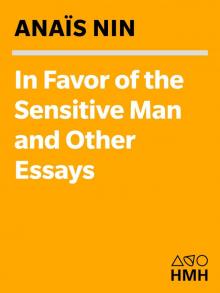 In Favor of the Sensitive Man and Other Essays (Original Harvest Book; Hb333)
In Favor of the Sensitive Man and Other Essays (Original Harvest Book; Hb333)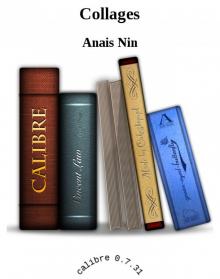 Collages
Collages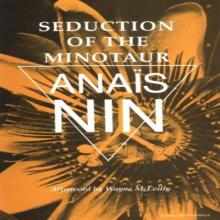 Seduction of the Minotaur
Seduction of the Minotaur Children of the Albatross
Children of the Albatross Delta of Venus
Delta of Venus The Four-Chambered Heart coti-3
The Four-Chambered Heart coti-3 Diary of Anais Nin, Volume 2
Diary of Anais Nin, Volume 2 Diary of Anais Nin, Volume 1
Diary of Anais Nin, Volume 1 Diary of Anais Nin, Volume 4
Diary of Anais Nin, Volume 4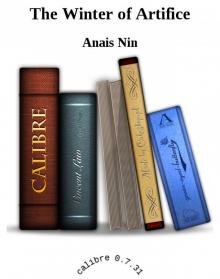 The Winter of Artifice
The Winter of Artifice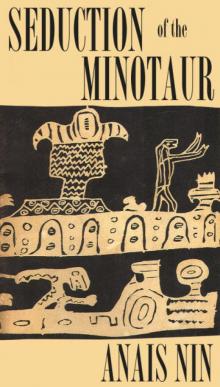 Seduction of the Minotaur coti-5
Seduction of the Minotaur coti-5 Children of the Albatross coti-2
Children of the Albatross coti-2 Henry and June: From A Journal of Love -The Unexpurgated Diary of Anaïs Nin (1931-1932)
Henry and June: From A Journal of Love -The Unexpurgated Diary of Anaïs Nin (1931-1932) Ladders to Fire
Ladders to Fire House of Incest
House of Incest